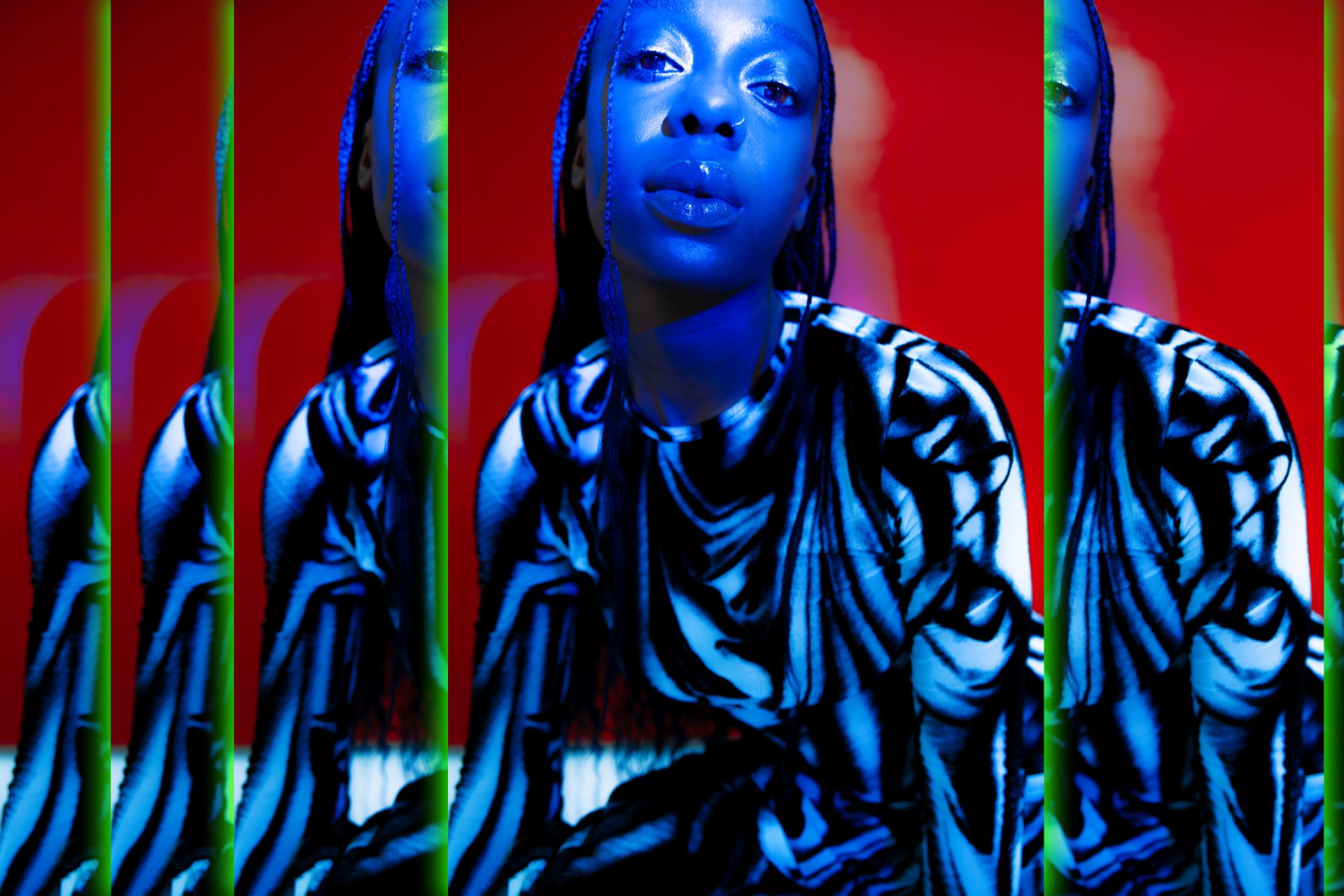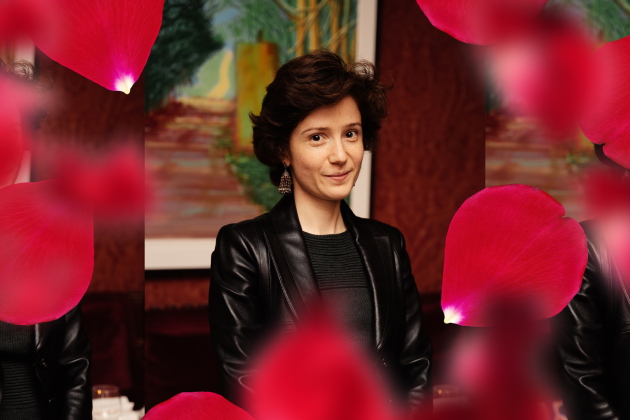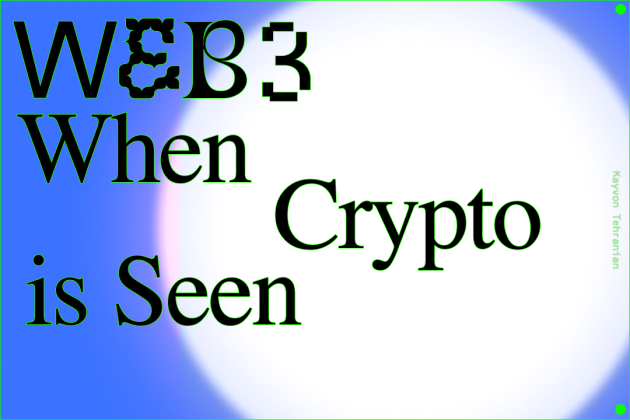Debby Friday on doing something different and weird.

A multidisciplinary artist whose work spans music, film, writing, and visual art, DEBBY FRIDAY does it all. After spending her formative years enmeshed in the club scene and later establishing herself as a touring musician, the pandemic could have brought her career to a halt—but instead it opened up a whole new aspect to her practice. Over the past year and a half, she’s written, directed, and scored her first short film, BARE BONES, which premiered at MUTEK Montreal and was an official selection at the 2021 Toronto Lift Off Film Festival. She also co-directed and released the music video for her latest single, “RUNNIN,” and debuted her graduate thesis project, the audio-play LINK SICK, for which she also minted her first NFT.
Now, she’s back in the thick of her creative process with a brand-new audio-visual play called VOW. With ever-morphing, hypnotic visuals and a thick dose of sensory stimulation, VOW explores themes of human entanglement, virtual living, and deep consciousness. In the wake of VOW’s debut, and a corresponding NFT release on Foundation, we spoke to the artist about how she conceptualized the work, plus how her background in the club scene has informed her approach to creating experimental, otherworldly masterpieces.
What was the genesis of your audio-visual play, VOW? How did it come to be?
VOW initially started with an audio play I created earlier this year called LINK SICK, which was my thesis project. It told a fictionalized story based off of some of my experiences as a club rat, which was a very formative time in my life. In my youth, I was also heavily influenced by sci-fi and so it takes place in what I see as an amalgamation of “futures” I’ve imagined. Making that piece was the first time I tried using audio in this kind of way to tell a story.
A few months ago I received a commission to do a project for Debaser, and I decided to expand the universe of LINK SICK by creating another story in the same world—this time with different themes and characters. VOW revolves around three characters, two of whom are uploading their consciousness into VIRTUAL (a digital reality) by taking what's called VOW. Through this process, their codes end up becoming entangled with one another and this leads them to have conversations about the nature of their digital world, the universe, what it means to be a human and what it means to be together with another person.
As I was developing the premise for the work, I found the website, thispersondoesnotexist.com, and it creeped me out so much. I had a physical, visceral reaction to it. I like to investigate things that make me feel something, especially if it’s unfamiliar and so I started reading about GANs, neural networks, and machine learning. From there, I had the idea to take photos of real people here in Vancouver, and upload them into Artbreeder in combination with GAN generated portraits, to generate new facial images—which turned into these gorgeous, creepy and disturbing amalgamations of faces. So, the characters ended up being a combination of people who both do and don’t exist. The faces are ever-shifting. Sometimes they look more like abstract, Rothko-esque paintings where you don't even see a face. But then as the story progresses they morph and take shape, and it becomes a kind of metaphor for how consciousness comes into focus—or for the way that we as human beings become ourselves. You are born a clustered, potato-looking creature and slowly over time, you take shape, you emerge. The same thing is happening with the internet, with the digital landscape and its inhabitants.
What was your experience like in the clubs when you were growing up? Why was that such a significant time for you?
I really did come of age in the club or the rave or whatever you want to call it. It was such a cathartic thing to go out and dance all night, and go home only when the sun came up. You’re sweating, you're in this dark space, the music is trance-inducing and you're surrounded by what feels like millions of other people. In the club, you enter this very fertile, altered reality where it’s possible to have these moments of rebirth and reshaping on a spiritual level. It’s like going to church. When you come out, you’re new again.
When I was clubbing, it made everything else worthwhile. Going to the club with my friends was all I thought about. It's a staple of youth culture— and it is where I got to experience and hear so many things that I would have never heard otherwise. And it did something to my brain by reshaping my understanding of connection, because of how widespread the network of club culture is.
It also completely reshaped my idea of what it means to be a person. People would come into the club dressed up in such extravagant outfits and behaving in these caricaturistic ways that made something as simple as a warehouse take on this other-worldly dimension. When I think about the world of VIRTUAL and the stories I've written so far, they’re all about people who are putting on a sort of costume to live their lives—either at the club, or just as their digital selves. And it parallels what I see these days, where your online identity is a reflection and rarefaction of some parts of you. Never the whole, though.
Since club experiences have been so fruitful for your creative practice, what has it been like during the pandemic, when those spaces have been shut down?
My club days were already winding down before the pandemic. I had quit DJing the year before and was focusing on playing live shows, doing a lot of touring, and performing my music. A lot of that takes place in club spaces, so I was still connected to these communities. But ever since COVID, I haven't been in a club. I haven’t been to a live show or anything.
I really miss it but I can't complain though, because I'm all about evolution and change. I do feel a sense of longing for those times, especially of being surrounded by other people. I love to be together with others, and throughout this whole pandemic, they've just been telling us to stay home and be alone. So, I have just been by myself for the most part.
How did being alone affect your creative process?
It actually gave me space to do different things. I made my first film during COVID, and my first audio play. I started writing seriously again, I'm going to make another film, and I've been working on my album—so overall, it's given me a lot of space to do things that I wouldn't have had the time for if I had been touring. I'm grateful that it's opened up other aspects of my practice, and now, after having done those projects over the pandemic, even more ideas are coming to me. I'm starting to understand myself as a full-fledged, truly multidisciplinary artist. I want to make different, weird projects and have fun with it.
You mentioned that in VOW, there are two people who are becoming entangled with each other as they upload their brains into virtual reality. Is this a utopian vision? Are we glad that we're entangled with all of these things? Or is it dystopian?
I’d describe it as a “neutropia,” in the sense that it's neutral. It's not a utopia or a dystopia. It just is what it is, which is the way I view our current existence and world. There are a lot of conversations about, “Do we live in a techno dystopia?” I'm like, “That’s the wrong question. It doesn't really matter. It just is what it is.”
When I think about VOW, and about these characters and their entangled world, it's just my way of being in conversation with what I see happening today. The internet and everything that goes with it were created to be tools of connectivity. But they also have a lot of other energies within them, including corporate control, surveillance, and many other things. It's easy to feel paranoid about what that might mean. But I think instead of getting scared, we should take a step back and just see it for what it is. This is the world that we exist in, so if we accept that, then how do we navigate it? How do we want to exist in this kind of world?
One of the most important things happening now is the growing sense of entanglement between people yet the rising feelings of alienation. Connection is literally intrinsic to human beings. We are relational creatures. We need and desire each other. There's no human who is able to exist as an island. That being said, there is something happening with the fact that we are more connected than ever and yet so many people feel so alone. That's important thing to think about, especially in the context of how we use technologies, and where it’s all heading.
There's this adage in psychology discourse that goes something like, "Bad connection is better than no connection at all." That's what I think about when I see people fighting online. I try to be mindful of the way that I engage in digital spaces, but overall, we're still in this new phase of the internet where it hasn’t clicked in a lot of people's heads that there is a real person on the other side of the screen. Someone who breathes and blinks and feels just like you do.
Another reason why I brought the GAN element into VOW was to hint at what it means to have real people’s identities intermingling with people who don’t really exist. The faces that came out of the GAN don't exist IRL, but on my computer, they do. So, it all just circles back to these big questions of, “What is existence? What is being? What's consciousness?” All that fun stuff. [Laughs]
I’m guessing that most people know you as a musician more than as an artist. How would you describe your visual art?
I would put my visual art under the same umbrella as everything else that I do, which is experimentation. I consider myself an experimentalist because I love trying out different mediums, disciplines, materials, techniques, and tools. I love to learn. When I learn something new, I'm going to find a way to incorporate it into my artistic practice in some way.
Overall, everything I make comes from my desire to express myself while connecting with other people. I make things to get whatever is inside of me out, or as a therapeutic process. But I also want my work to speak to other people. I want to be in conversation with my audience, and I do that by showing them these otherwise hidden parts of myself.
I read somewhere that you were calling your latest single a rebirth. Who’s the new, reborn Debby?
The reborn Debby is just another iteration of me becoming myself. There are going to be many more rebirths, always, all the time. Change is the only constant. And so, that's what you're getting: New Debby, again and again and again.
How did NFTs come onto your radar, and what made you want to get into the space?
I started getting into crypto during the pandemic out of a desire to become more financially literate after my main source of income, touring, was no longer viable. I'd always been aware of Bitcoin and stuff, but I didn't really know anything about it or how it worked. I have a knowledgeable friend who works in crypto, and she has helped me a lot with the basics. So that's where my crypto education started.
Then earlier this year, I was introduced to NFTs. I immediately saw it as a new way to engage with the arts. Everything is a tool, and it's just another one of these tools. At this point, I enjoy the DeFi community a lot, and it’s helped me understand the way that regular money works—and therefore, the way that corruption and greed function on a technical level. I had no concept of this before. But as I started learning about crypto, I learned about the way that fiat currency works. The levels of how fucked up it is are just insane.
What was the biggest breakthrough for you when you were researching fiat vs. crypto?
I think the biggest one was that with crypto, your money is actually yours. It belongs to you. And learning that with fiat currency, that was not the case. It really blew me away, and bothered me. I was like, “My money is not even mine?” It happened at the same time that I was also trying to become more responsible and empowered in other aspects of my life—and I wanted to take control in a meaningful way. For me, that meant getting into crypto markets.
I know there's a lot of debate about NFTs and art, but I feel hopeful and invigorated by how they’ve given artists a new platform to make money from their work. It takes art out of the traditional market, and puts it into this new space of possibility. Overall, I think NFTs are a space to do something different and weird—and that’s where I want to start.
Read more

Sarah Meyohas on bringing femininity into crypto.

Web3: When Crypto is seen.
